- Home
- Will Hobbs
Jason's Gold Page 16
Jason's Gold Read online
Page 16
His brothers burst out laughing: Charlie too.
Jason said, “I guess most of these men aren’t the claim owners. Are most working for wages?”
“You bet they are,” Abe agreed.
Jason grinned. “I’m thinking how much I love the smell of sawdust.”
All the while, his eyes were scanning the ranks of the miners close and far. He was looking for a girl among them, a girl with hair dark as a raven’s wing, alongside a man with a beard that was gray and big enough for birds to nest in. Would he run across them in Dawson? Had Jamie and Homer already gone home? They no longer had their farm to go home to.
Within a few days the Yukon rose with the spring runoff, spilled over its banks, and flooded Dawson to the tops of the door frames. It was a close call, saving the machinery and the logs at the sawmill, and Jason was in the thick of the fight. The cabin on the hillside stayed high and dry.
As the waters ebbed, another sort of flood arrived—that of the world’s adventurers, twenty thousand almost at once and more to come. They found Dawson City knee-deep in muck.
Not that the muck slowed anyone or anything down. The boats kept coming, new buildings kept rising, and the sawmill kept working around the clock. It was light all night—no reason to shut down, except for Sundays. Jason threw himself into every job at the mill, worked ten hours a day, gave it every ounce of his determination.
It was the greatest feeling in the world being back with his brothers, working alongside them as an equal. He was so proud about the mill. If only their father could see them now!
It was different for Charlie. He’d become a valuable assistant to the bookkeeper, but his mother and Chicago remained at the forefront of his mind. Charlie decided he wanted to head back. The Hawthorn brothers told him that by August they could afford the tickets to get him all the way home.
Evenings and Sundays, Jason and Charlie walked up and down the streets of the city. Dawson was spilling in all directions; the tents of the stampeders checkered the hills with white even on the opposite shores of the river. The two of them stood on the riverbank along Front Street and watched the boats pour into town until they were three thick all the way up and down the Yukon, with barely room for the stern-wheelers from downstream.
Two of those steamboats, Seattle No. 1 and May West, had been stuck in the ice all winter at a place eight hundred miles downriver that the passengers called Suckerville. They’d been 314 days on the “all-water route” from Seattle, and they were angry as hornets. “Serves ’em right,” Charlie said, “for trying to do it the easy way.”
Of the Klondikers arriving from upstream, thousands rushed out of town to stake claims and try their luck with pick and shovel and gold pan, even though prospects were said to be poor. Many went to work for wages to earn their passage home. A few pushed off almost immediately for the fourteen-hundred-mile float down the Yukon to St. Michael, where they hoped to catch a ship.
Thousands simply milled around Dawson, gawking at the sights. It was a marvel simply to be here; they knew they’d never see the like of this again. Even though it was summer, they wore their fur hats like a badge. They were too worn-out by what they’d gone through to do much of anything but stroll. Every half hour they’d bump into someone they’d met during fall, winter, or spring along the trail, and they’d stop to swap stories.
It was a golden summer, though few found gold. There was a sense of pride that helped to alleviate the disappointment, a sense of satisfaction in having made it, which would be impossible to explain to folks back home.
Dawson was a carnival, a perpetual carnival. Jason and Charlie laughed their way through the auction of the first “cackleberry” laid in Dawson City—the egg sold for five dollars. They saw a miner from the creeks pay fifteen dollars for an eight-month-old newspaper that was soaked with bacon grease.
They came across a milk cow—a man had actually floated a milk cow into Dawson, and he was selling the milk at thirty dollars a gallon. Thirty dollars a gallon! They met another man who’d floated a slew of cats and kittens down the Yukon and was selling them for an ounce of gold apiece.
You could buy anything from clothes to fresh grapes to ice cream. Charlie was especially keen on ice cream. Strangely, perfectly good rifles were selling for a dollar each, and they were available by the hundreds. No one had any use for them anymore, not here. Pistols were strictly forbidden. Possession of one would have resulted in a quick “blue ticket” out of town. Nobody seemed to mind that there wasn’t a shooting a day, like in Skagway. There weren’t any shootings at all. Robberies were unheard of. The Mounties had succeeded in keeping the rush peaceful on the Canadian side of the border.
Jason and Charlie ran into the wizened old man Jason had met hauling the grindstone over the Chilkoot on his back. He was set up in a tent, sharpening miners’ picks or shovels for an ounce of gold apiece. An ounce of gold was worth sixteen dollars!
One day they had their photograph taken in a tent studio by Eric Hegg, the photographer Jason had met on the Chilkoot. Fastened to the canvas walls were photographs Hegg had taken along the way—of the endless chain of Klondikers going over the Chilkoot, of boats in the White Horse Rapids. There was even a picture of Hegg’s own sled drawn by his five longhaired goats.
Along Front Street one day, Jason came across the old-timer he’d met in the boxcar rolling across the prairies of North Dakota. The grizzled veteran of the ’49 rush and many others was starting up the gangplank of a departing stern-wheeler.
“Old-timer,” Jason called. “Remember me?”
The old man squinted at him, then broke into a smile. “Sure do.”
“Did you strike it rich this time?”
“Sure didn’t the old man replied with a grin.
“Me neither, but I don’t give a hang.”
“Oh?”
“Doesn’t matter, because…I have seen the elephant!”
The old-timer waved his hat, laughing, and clambered onto the boat.
Always, Jason kept his eye out for Jamie, but after a few weeks had gone by, he’d pretty well given up. The Dunavants would have been broke, he realized. They’d probably left a few days before he got to town, on the first steamboat downriver.
On the last Saturday in June, Abe and Ethan took him and Charlie to see a variety show at the Palace Grand Theater. His brothers told them it had been running all winter and was the most popular show in Dawson. The show was enjoyable enough, mostly singing and dancing, but the last act—“The one you’ve all been waiting for”—shook him like a leaf. When the curtain was drawn, there stood Jamie at the front of the stage in a splendid white dress, black hair shining, with her father, Homer, in the background, scribbling on a notepad in front of a mock log cabin!
“That girl’s been performing all winter,” Ethan whispered. “She’s the Princess of Dawson.”
As Jamie struck a pose and began to speak, a profound hush came over the audience:
“When you can’t climb a step more, my friend,
Don’t look at the ground, don’t ever give in.
Lift your eyes to the peaks, you’ll shed your cares,
There’s glory there, at the top of the Stairs.
Lift up your eyes, don’t ever despair,
There’s glory there, at the top of the Stairs.
To give in, my friend, would be such a pity,
For it’s not the gold that counts—
It’s reaching the Golden City.
LIFT UP YOUR EYES!”
When Jamie shouted the last line and raised her hands dramatically above her head, the entire theater responded with a roar and with deafening cheers. Jason looked around, dumbfounded by the power of the chord Jamie had struck. It was reverberating in every heart. He’d seen her father writing this very poem that day, on the way over to Dyea, as Homer had looked from his notepad to those snow-clad peaks!
Jamie went on to perform a dozen more of her father’s poems. They were tales of the rush, rhyming narratives o
f the trials and tribulations and the longings that everyone in the house had experienced. Often they spoke of home and hearth and loved ones far away.
At the mere mention of home, coming from the lips of this lovely young girl, hundreds of grown men, hardened-looking men, would burst into tears, some of them weeping shamelessly. As Jason scanned the crowd, his eyes suddenly locked on a familiar face. To his astonishment, it was his friend Jack London.
TWENTY—SIX
Jack was staring beyond the girl to the poet, whose only role in the performance was, alternately, to reflect and scribble a few words on his notepad. Jack’s eyes were blazing with an intense fire, and there was a quiet sort of joy lighting his face.
With the last standing ovation of the evening, Jamie and her father disappeared backstage. Jason was still stunned. Jamie was here! He could see her after all.
First, he’d run for his old friend Jack before he disappeared in the crowd.
London beamed with sudden recognition. “You made it!” he exclaimed, pumping Jason’s hand. Jack had lost several more teeth, and his cheeks were puffy, but those blue-gray eyes still radiated his infectious good nature. “I’ve been wondering when I’d come across you, Jason. Did you find your brothers?”
Jason pointed. “They’re right over there.”
“Good, good…. Do you see that big fellow standing next to your brothers, the one talking to the boy with the crutch? Know who that is?”
When Jason shook his head, Jack said, “That’s Big Alex McDonald, one of the kings of the Klondike! Owns shares in fifty claims, they say, and many of the buildings in town. You mustn’t have wintered in Dawson, I take it.”
“I wintered at Five Fingers, with that boy you pointed out. That’s my friend Charlie.”
“What held you up?”
Jason smiled at the way Jack had put it. “A moose did.”
“I’d love to hear that story….”
“What about you? Where’d you winter?”
“At the mouth of the Stewart. I staked a claim on a creek nearby, then floated on down to Dawson right before freeze-up. I spent about six weeks just taking in the stories here, then tromped back on foot to the Stewart in early December. Was it ever cold! Fifty degrees below zero.”
“What about your claim? Strike it rich, did you?”
London pulled a small vial out of his shirt pocket. “Got it right here.”
Jason scrutinized the bottom of the vial. There was gold dust there, all right, a few flakes—not much.
“Four dollars and fifty cents,” Jack said with a laugh. “Won’t exactly see me home.”
“You’re leaving?”
“Tomorrow. I’ll be floating out with a couple other fellows on a scow. In three weeks or so we ought to make it to St. Michael. From there I hope to find work on a ship back to California.”
Jack had been sitting all this while, and now he attempted to stand up. “Whoa,” he groaned.
“What’s the matter?”
“It’s this accursed scurvy; I’ve been in a pitiful way all winter. But I need to go home anyway…. My father was bad sick when I left.”
They arranged to meet the next day, and then Jason bolted onto the stage. At the dressing room door he was stopped in his tracks by a man in a tailcoat who sported a waxy handlebar mustache. “I’d like to see Jamie Dunavant,” Jason said, all out of breath.
The man’s thin eyebrows rose haughtily. “Wouldn’t everybody?”
“You don’t understand—I’m an old friend.”
“I’m sure you are.”
“All you’ll need to do is tell her my name…. Wait a minute—I’ll write it down for you.” Jason pulled the stub of a thick lumber-marking pencil out of his shirt pocket and wrote his name on the back of the evening’s program, along with “Hawthorn Brothers Sawmill.”
“Just show her this, and tell her I’m out here,” he said. Then he added, “I’d be much obliged. I met her back in Skagway….”
The man shrugged, nodded curtly, and disappeared inside. A minute later he was back, without Jamie. “Well?” Jason asked.
“You have to understand,” the doorman said. “A lot of people would like to see Miss Dunavant. She’s a very famous person.”
“You mean…she won’t see me?”
“She simply can’t take the time. I’m sorry, but you’ll have to run along, before I—”
Jason left without another word. He was burning with embarrassment.
In a daze, he found himself back with his brothers and Charlie. They asked where he’d been; he mumbled something about a friend named Jack.
Still reeling, he followed his brothers and Charlie to the rooms of Big Alex McDonald. McDonald was a simple, slow-talking bear of a man with hands the size of hams. His lavish accommodations, all decorated with art and gilded mirrors and ostrich feathers, polished brass and cut-glass chandeliers, seemed so unlike the man who inhabited them. Big Alex, upon seeing Charlie at the theater with his crutch, had sought him out after the show and asked what had happened to him. “I want you to see my fishbowl,” Big Alex had said after hearing Charlie’s story.
Now that everyone was in his rooms, it was apparent that the fishbowl Big Alex had been talking about was a huge bowl of etched glass displayed on a fancy marble stand. It was filled to the brim with gold nuggets.
“Now, how soon are you going to be able to get back to Chicago to meet up with your mother?” Big Alex asked Charlie.
“The Hawthorns here are going to help me, soon as they can afford it. I’m hoping by August I’ll be leaving.”
“But you’d rather go sooner, I take it.”
“Yes, sir, I’m pretty ready to go home.”
“Well then, son, you just reach into that fishbowl there and help yourself.”
Charlie looked at him uncertainly.
“Help yourself!”
Charlie reached in and took a few nuggets in his palm. One was big as an acorn.
“No, no!” Big Alex said, waving his hand. “I mean fill both trouser pockets full as you can get ’em, then your shirt pockets too. Gold means nothing to me, lad. Nothing!”
Still numb from the way Jamie had treated him, Jason went to the docks the next day to see off his friend Jack. He spotted London aboard a crude scow that was little more than a planked-over raft of logs. Jack was busy mending the attachment of the big sweep oar at the stern, but he waved Jason aboard.
Unlike the Princess of Dawson, Jason thought bitterly.
Jack showed him around the scow. “That’s a sleeping shed in the middle here, and look—our yacht’s even got a mud hearth for cooking. Yessir, I’m on to the next chapter of my life.”
“I’m sorry you’re not staying, I really am.”
“It’s a grand country, Jason, and it’ll stay in my blood. But I’m determined as ever to find a way to live on my own hook. I keep telling myself that it must be possible to make my living with my mind instead of my muscle. I never told you this, but what I’d really like to be is a writer.”
“Like Rudyard Kipling or Mark Twain?”
Jack tossed back the shock of hair that was always falling in his eye, and he laughed. “Exactly. Why not? Why not Jack London? Maybe I can mine some other kind of gold out of this whole experience.”
Here came Jack’s boat mates, two fellows who looked like scarecrows. “Let’s shove off,” one of them grunted.
It was time to say good-bye, shake hands, and disembark. Jason untied the heavy rope holding the scow and tossed it aboard. The ungainly craft began to drift. “Good luck with the mill,” Jack called. “In the years to come, I’ll be picturing you up here.”
“I’ll be here. And I’ll be looking for your books!”
Jason watched his friend disappear around the bend, working that big sweep oar.
The good-byes were coming too fast. Three days later he saw Charlie off on a steamboat fixed up fancy as a wedding cake. At the last, Charlie vowed he’d come back once he’d seen his mother, and th
at he’d live the rest of his life in the North with the Hawthorn brothers. Whether he really would see Charlie again, Jason wasn’t so sure.
Jason threw himself into the work at the mill. Business was booming, and his brothers said he was doing the work of three men. He never told them that it was helping him keep his mind off a girl named Jamie.
He didn’t go back to the Palace Grand Theater to see her perform; he even avoided the streets of Dawson on Sundays, when the mill was closed. He didn’t want to turn a corner and suddenly run into her.
In the fourth week of July, Dawson was electrified by the news that Soapy Smith had been shot dead in Skagway. A throng assembled in front of the theater to hear the particulars read. The man who’d killed him, in a one-on-one gun battle on July 8, was a surveyor named Frank Reid. In the exchange, Reid was hit; he underwent an operation but died from his wounds. Eleven of Smith’s gang, including Slim Jim Foster, Charles Bowers, Old Man Tripp, and Kid Barker, were being shipped to Sitka for trial.
Cheers went up, including Jason’s. Many around him, he guessed, had also been victims of the gang. He remembered how they had swindled Jamie’s father.
He wondered if she was here, at this moment. He found himself scanning the crowds for her, not knowing how he’d feel if he saw her face. But he didn’t see her.
Finally it happened. Two weeks later he was stacking lumber at the mill when he saw the flash of a billowy white dress from the corner of his eye. He straightened his aching back and turned, to see her right there in front of him in the lumberyard.
“Jason!” she cried. “It’s so good to see you!”
He didn’t know what to say. What was she doing here?
“Hello,” he said awkwardly.
Her face wilted. “What’s the matter?” she said, looking all around, as if she’d find an explanation in the lumberyard.
A dozen men, including his brothers, were standing still as statues, looking at them. Not only was it a girl; they all knew who it was. “Let’s go where we can talk,” Jason said, and he led her around a mountain of logs and down to the riverbank.

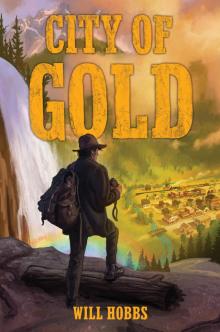 City of Gold
City of Gold Kokopelli's Flute
Kokopelli's Flute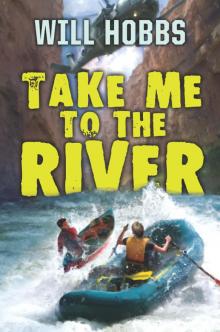 Take Me to the River
Take Me to the River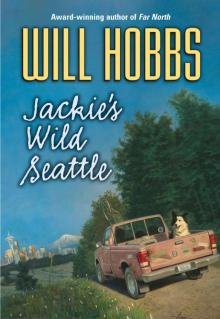 Jackie's Wild Seattle
Jackie's Wild Seattle The Maze
The Maze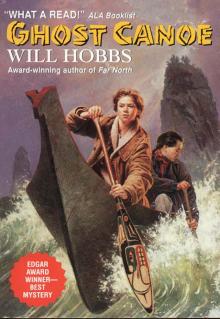 Ghost Canoe
Ghost Canoe Never Say Die
Never Say Die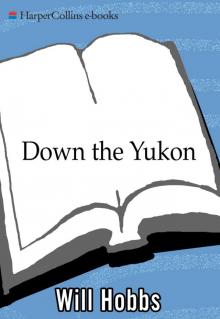 Down the Yukon
Down the Yukon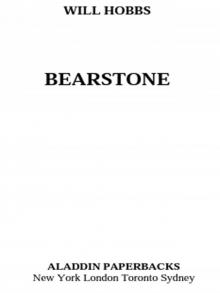 Bearstone
Bearstone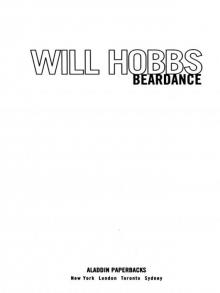 Beardance
Beardance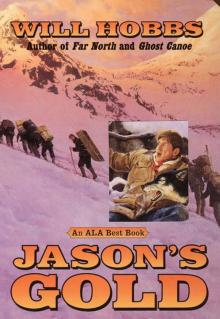 Jason's Gold
Jason's Gold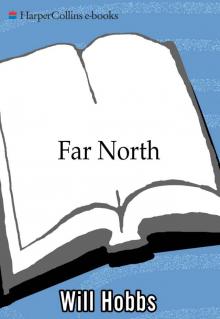 Far North
Far North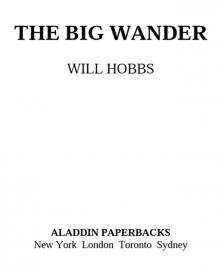 The Big Wander
The Big Wander River Thunder
River Thunder Downriver
Downriver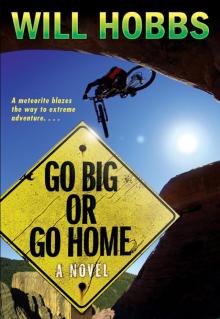 Go Big or Go Home
Go Big or Go Home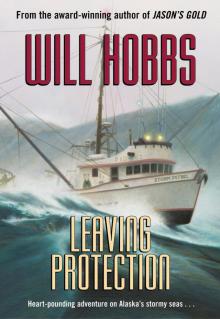 Leaving Protection
Leaving Protection Wild Man Island
Wild Man Island